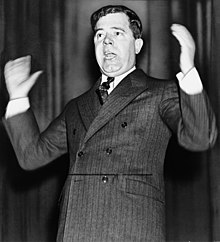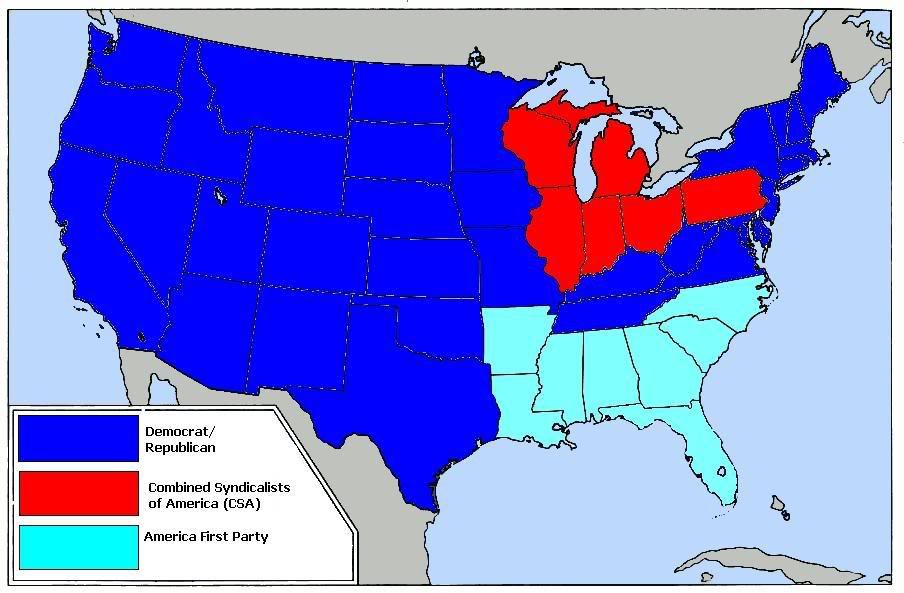America First Union Party
From Kaiserreich
(Complete revision of the article) |
|||
| (6 intermediate revisions not shown) | |||
| Line 1: | Line 1: | ||
| + | {{image|http://upload.wikimedia.org/wikipedia/commons/thumb/9/91/HueyPLongGesture.jpg/220px-HueyPLongGesture.jpg|right|AH|Senator Long announcing the creation of the party}} | ||
The '''America First Union Party''', also known simply as '''America First Party''', is an [[Usa|American]] political party that will participate to the upcoming [[Usa#Politics|1936 Presidential Election]] of the United States of America. | The '''America First Union Party''', also known simply as '''America First Party''', is an [[Usa|American]] political party that will participate to the upcoming [[Usa#Politics|1936 Presidential Election]] of the United States of America. | ||
==History== | ==History== | ||
| - | |||
The America First Union Party was founded in 1934 by '''[[Huey Long]]''', Senator for Louisiana. After the defeat of [[Franklin Delano Roosevelt]] and the Democratic Party in the 1932 Presidential Election, Senator Long decided to create his own party to run for Presidency and support his [[Huey Long#Share Our Wealth|Share Our Wealth]] program. | The America First Union Party was founded in 1934 by '''[[Huey Long]]''', Senator for Louisiana. After the defeat of [[Franklin Delano Roosevelt]] and the Democratic Party in the 1932 Presidential Election, Senator Long decided to create his own party to run for Presidency and support his [[Huey Long#Share Our Wealth|Share Our Wealth]] program. | ||
==Influence and Politics== | ==Influence and Politics== | ||
With its support primarily coming from the depressed agricultural regions of the South and Mid-West, the America First Union Party combines traditional populism with neo-capitalist modes of organization, demanding redistribution of wealth and social welfare, but within a strong centralized corporatist economic structure, controlled by a paternalistic economic and political elite. | With its support primarily coming from the depressed agricultural regions of the South and Mid-West, the America First Union Party combines traditional populism with neo-capitalist modes of organization, demanding redistribution of wealth and social welfare, but within a strong centralized corporatist economic structure, controlled by a paternalistic economic and political elite. | ||
| + | |||
| + | It is commonly believed that [[Lawrence Dennis]] and his books ''Is Democracy Doomed?'' and ''The Coming American Corporatism'' had a strong influence in the development of the concept of a corporatist economic structure supported by the America First Union Party. | ||
==Factions== | ==Factions== | ||
| + | {{image|http://Pictat.com/t/2013/3/25/4875038538ameri.png|right|AH|The party logo, referred to as the "Party Eagle." The lesser symbol consisted simply of the shield or just as the crossed sword and torch.}} | ||
Besides Senator Long, the charismatic founder and leader, the America First Union Party is divided among different factions: | Besides Senator Long, the charismatic founder and leader, the America First Union Party is divided among different factions: | ||
* Huey Long and '''Gerald Smith''' lead the largest faction of the party and Smith is the main candidates for Vice-Presidency in the 1936 Presidential Elections; | * Huey Long and '''Gerald Smith''' lead the largest faction of the party and Smith is the main candidates for Vice-Presidency in the 1936 Presidential Elections; | ||
| - | * '''Father Charles Coughlin''' is an important and well-known figure of the Party and has many followers (mainly thanks to his radio broadcast), even if his | + | * '''Father Charles Coughlin''' is an important and well-known figure of the Party and has many followers (mainly thanks to his radio broadcast), even if his racialist and anti-semitic beliefs are in contrast with Long's politics; |
| + | |||
| + | * '''[[William Dudley Pelley]]''' leads the more authoritarian and militaristic faction of the party and has often criticized Long for his (according to Pelley) "too soft policies"; | ||
| - | |||
* the more democratic and moderate faction is usually considered the less influential but is led by the popular and well known '''Charles Lindbergh'''; | * the more democratic and moderate faction is usually considered the less influential but is led by the popular and well known '''Charles Lindbergh'''; | ||
Current revision as of 16:45, 11 November 2013
|
The America First Union Party, also known simply as America First Party, is an American political party that will participate to the upcoming 1936 Presidential Election of the United States of America.
History
The America First Union Party was founded in 1934 by Huey Long, Senator for Louisiana. After the defeat of Franklin Delano Roosevelt and the Democratic Party in the 1932 Presidential Election, Senator Long decided to create his own party to run for Presidency and support his Share Our Wealth program.
Influence and Politics
With its support primarily coming from the depressed agricultural regions of the South and Mid-West, the America First Union Party combines traditional populism with neo-capitalist modes of organization, demanding redistribution of wealth and social welfare, but within a strong centralized corporatist economic structure, controlled by a paternalistic economic and political elite.
It is commonly believed that Lawrence Dennis and his books Is Democracy Doomed? and The Coming American Corporatism had a strong influence in the development of the concept of a corporatist economic structure supported by the America First Union Party.
Factions
|
Besides Senator Long, the charismatic founder and leader, the America First Union Party is divided among different factions:
- Huey Long and Gerald Smith lead the largest faction of the party and Smith is the main candidates for Vice-Presidency in the 1936 Presidential Elections;
- Father Charles Coughlin is an important and well-known figure of the Party and has many followers (mainly thanks to his radio broadcast), even if his racialist and anti-semitic beliefs are in contrast with Long's politics;
- William Dudley Pelley leads the more authoritarian and militaristic faction of the party and has often criticized Long for his (according to Pelley) "too soft policies";
- the more democratic and moderate faction is usually considered the less influential but is led by the popular and well known Charles Lindbergh;
|



